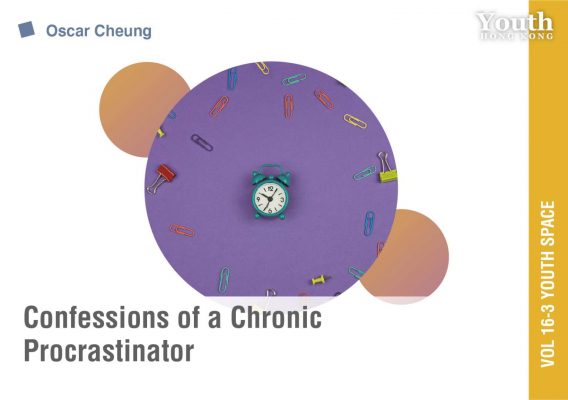//16.3 Youth Space: Life
Confessions of a Chronic Procrastinator
by Oscar Cheung
While many of us simply accept procrastination as a part of life, Oscar chose to confront it this summer vacation with a solid plan.
Here I am again, seated anxiously in my classroom, a mere week since the end of my final exams. This time, I am awaiting my fate in mathematics, my worst subject. My heart is thumping and I feel my fingers involuntarily drumming against the desk. I glance around at my classmates, all visibly unperturbed, some even gleeful.
The class settles into silent composure. All except for me.
I hear my name, so I drift along the aisle to the front of the classroom. I feel too ashamed to look up at my teacher’s face, so I just grimace and hold out my trembling hands.
Of course, I failed that paper. But I had it coming.
In preparation for my maths finals, I had planned on doing sample papers in the weeks leading up to the exam. However, I kept avoiding it, and instead made time for studying simpler subjects, taking naps, and even sitting idly at my desk.
Does this situation sound familiar? You may be a procrastinator, just like me and up to 95% of college students. Ever since primary school, I have been struggling with managing my time – getting things started and getting things done.
Besides exam revision, procrastination also manifests itself in assignments, important decisions, and sleep. It is evident that this is not merely an academic issue – the multifaceted pitfalls could linger through one’s teenage years and even into adulthood. Over time, fighting against the clock means compromising one’s quality of work, losing reputation among peers and seniors, and causing guilt, stress, and poor mental health.
Why is it so difficult for us to change, though?
Procrastination typically stems from instant gratification: the neglect of major, lengthy benefits in favour of minor, brief fulfilments. Whenever we satisfy ourselves with a quick fix, we experience a dopamine surge. Our brains then crave for these short-term rewards, thus diverting us from long-term goals. Why work tirelessly towards a distant aim when you could seek pleasure easily and instantly, right?
In his TED Talk, blogger Tim Urban analogises instant gratification with a monkey which distracts us from making rational decisions. The monkey can only be driven away by a “Panic Monster”: a tangible risk, such as an impending deadline. Only then can a procrastinator hurriedly work towards their goal. Personally, the problem is that most of the time, the crisis at hand is successfully averted. If I can get consistent results even with procrastination, what point is there in changing my routine?
However, the bullet I was not able to dodge was my maths exam. This was my wake-up call to prevent the problem from snowballing into something that could wreck my future. During summer break, I took steps towards conquering procrastination by being practical, mindful, and determined.
Firstly, I made sure that my goals were clear, specific, and manageable. By breaking large, daunting tasks into smaller, simpler ones, I could get everything done progressively, rather than all at once in a frantic mess. For my book report, for example, I aimed to finish reading one chapter every two days. Something realistic and doable.
Oftentimes, procrastination goes hand in hand with perfectionism. Perfectionists tend to aim for flawless results. If they are afraid of failing to do so, they could find it difficult to start doing anything at all. Letting go of unrealistic standards helps mitigate disappointment.
Secondly, I learnt to possess a healthy attitude towards working. People struggle with productivity when they are ill, and the same goes for whenever they feel down or burnt out. Mental wellbeing is just as important as physical health, and doing work is much easier when I have motivation. To get myself into the right mindset, I focus on the positives of every situation and avoid dwelling on mistakes.
The Pomodoro Technique is a time management method which breaks up work sessions with frequent small breaks, for example, a five-minute break after 25 minutes of studying. This helps me keep track of my progress and minimises distractions. Besides, it gives me time to practise mindfulness techniques like meditation to unwind, regain concentration, and feel refreshed.
Finally, I tried to cultivate self-discipline. After all, what is the point of creating a schedule if you cannot stick to it? The key is to foster proper time management and persistent commitment. Using the Eisenhower Matrix, a decision-making principle and productivity tool, I prioritised my activities in terms of importance and urgency. Developing diligence is the most difficult part, as it requires a clear motive and goal. For me, the aim was to improve my scores in maths after my setback last term. I remind myself of this constantly to keep my fighting spirit alight.
If you are finding it difficult to build a new habit, James Clear proposed the Two-Minute Rule in his bestselling book Atomic Habits: “When you start a new habit, it should take less than two minutes to do.” For example, start by doing one maths practice problem today, then do one more the day after. By ultra-simplifying a chore to make it effortless to stick to, it aims to gradually cultivate a routine from the bottom up.
Obviously, changing a bad habit is easier said than done. In fact, I even struggled with writing this article! It may seem hypocritical, but the journey of self-improvement is never-ending, and acknowledging small steps of progress is a crucial component.
This summer, I started working on my holiday homework earlier, and made time in my routine to prepare materials for the coming school year. In the midst of setbacks, it might be easy to discredit your small achievements, but slow progress is always better than none.
In David Copperfield, Charles Dickens wrote: “Procrastination is the thief of time. Collar him!”
Fellow procrastinators, September marks the beginning of the new school year for many of us. May this fresh start motivate us to stop procrastination from robbing our lifetimes away! ■
Oscar Cheung, 15, is a member of Youth Hong Kong’s young writers team. He is from St. Paul’s College and participated in The HKFYG English Public Speaking Contest. Passionate about experimentation, writing, music, and most importantly, life, he strives to find joy in even the most mundane things and share that happiness with those around him.



